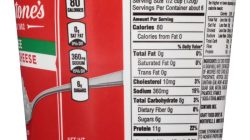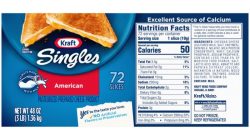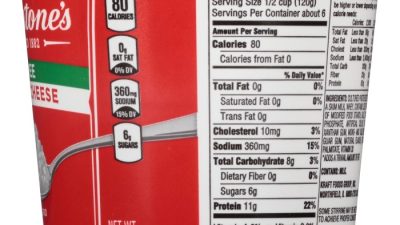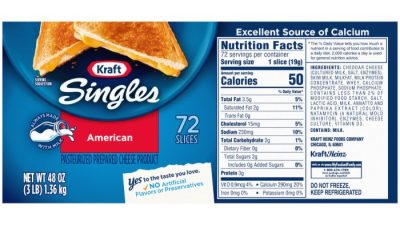Health Benefits of Consuming 4% Cottage Cheese
4 cottage cheese nutrition – Yo, fam! Let’s get real about the nutritional power of 4% cottage cheese. Forget the diet fads; this stuff is a legit game-changer for your health, and we’re about to break it down. It’s not just a healthy snack; it’s a serious contender in your fitness and wellbeing arsenal.
High Protein Content for Muscle Building and Satiety
Right, so 4% cottage cheese is stacked with protein. We’re talking about the building blocks for your muscles, bruv. This high protein content means it helps you build and repair muscle tissue, crucial for anyone hitting the gym or just wanting to stay strong. But it’s not just about gains; the protein also keeps you feeling full for longer.
That means fewer cravings and less chance of snacking on rubbish between meals, leading to better weight management. Think of it as your body’s natural appetite suppressant. Imagine a post-workout snack that actually fuels your recovery and keeps you feeling satisfied – that’s 4% cottage cheese doing its thing.
Calcium and Other Minerals for Bone Health
Your bones need love too, innit? Cottage cheese is a solid source of calcium, a mineral absolutely essential for strong, healthy bones. We’re talking about preventing osteoporosis and keeping your skeletal system ticking over like a well-oiled machine. It’s not just calcium though; it also packs other vital minerals like phosphorus and riboflavin, all contributing to overall bone health and general wellbeing.
Think of it as a stealthy way to boost your bone density without even trying too hard.
Weight Management and Blood Sugar Control
Let’s be honest, managing your weight and blood sugar can be a struggle. But 4% cottage cheese can be a valuable ally. That high protein content again – it helps you feel fuller for longer, curbing those hunger pangs and preventing overeating. Plus, the relatively low carbohydrate content means it won’t cause those dramatic blood sugar spikes that leave you feeling sluggish and craving more sugary treats.
It’s a slow-release energy source, keeping you feeling satisfied and energised without the crash. It’s like a steady burn, not a flash in the pan. This makes it a great option for people looking to manage their weight and maintain stable blood sugar levels.
4% Cottage Cheese in Different Diets
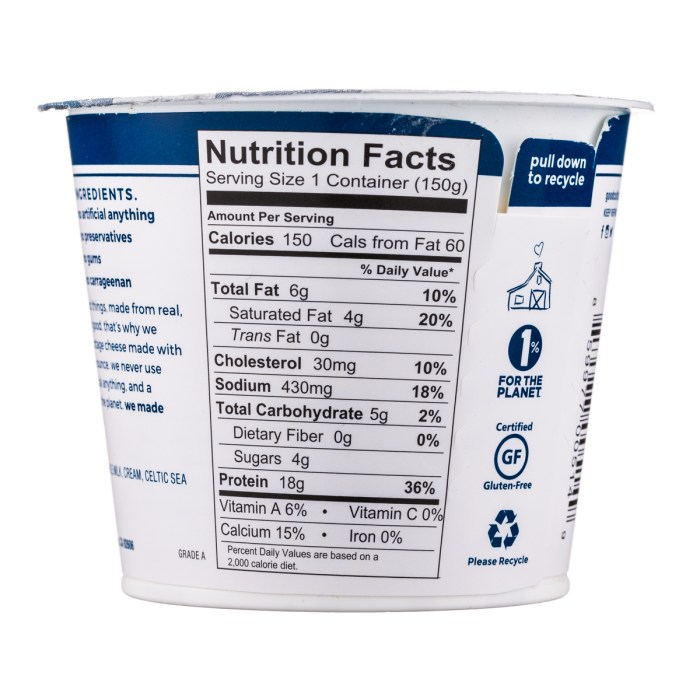
Yo, fam! Let’s get real about how this 4% cottage cheese fits into your life, whatever your vibe is. We’re talking balanced diets, banging recipes, and whether it’s your new best mate if you’re on a specific eating plan. This ain’t just another health food, it’s a versatile MVP.
Understanding 4 cottage cheese nutrition is crucial for a balanced diet. Its protein content is often compared to that of other dairy products, leading us to consider the nutritional profile of similar cheeses, such as the information available on nutrition in cream cheese. Comparing these helps us make informed choices about dairy inclusion in our meals, ultimately enhancing our understanding of 4 cottage cheese nutrition within a broader context of dairy consumption.
This creamy, protein-packed powerhouse is seriously adaptable. Whether you’re aiming for a leaner physique, bulking up, or just trying to eat healthier, 4% cottage cheese can be your secret weapon. It’s low in fat, high in protein, and surprisingly easy to incorporate into a range of dishes – sweet or savoury, it’s all good.
Incorporating 4% Cottage Cheese into a Balanced Diet
Right, let’s get practical. Here’s how to sneak some cottage cheese into your daily grind without feeling like you’re on a diet. A balanced diet should include a variety of foods from all food groups, and cottage cheese can play a role in achieving this. Think of it as a building block, not a whole meal.
- Breakfast: Start your day with a protein-packed breakfast bowl. Mix 1/2 cup of 4% cottage cheese with berries, a sprinkle of granola, and a drizzle of honey for a sweet and satisfying start.
- Lunch: Add a scoop of cottage cheese to your salad for a protein boost. It adds creaminess and a subtle tang without overpowering other flavours.
- Dinner: Use cottage cheese as a base for a healthy, protein-rich frittata. Whisk it with eggs, veggies, and herbs for a quick and easy dinner.
- Snack: A simple snack of 1/2 cup of cottage cheese with a few chopped nuts and seeds provides a satisfying protein and healthy fat combo.
Sample Meal Plan Incorporating 4% Cottage Cheese
Here’s a sample meal plan showing how easily 4% cottage cheese can be incorporated into a balanced diet. Remember, this is just a suggestion; adjust portion sizes to meet your individual needs and calorie goals.
- Breakfast: Cottage cheese with berries and a sprinkle of nuts.
- Lunch: Chicken salad sandwich on whole-wheat bread with cottage cheese mixed in.
- Dinner: Baked salmon with roasted vegetables and a side of cottage cheese.
- Snacks: Cottage cheese with apple slices, or cottage cheese mixed with savoury herbs and spices.
4% Cottage Cheese Recipes: Sweet and Savoury
Now for the good stuff – the recipes! This ain’t your grandma’s cottage cheese; we’re talking seriously tasty dishes here.
- Sweet: Cottage cheese pancakes. Blend cottage cheese with eggs, flour, and a touch of sweetener. Cook like regular pancakes for a protein-packed breakfast treat. Imagine fluffy, slightly tangy pancakes – pure bliss.
- Savoury: Cottage cheese and herb dip. Mix cottage cheese with fresh herbs like chives and dill, a squeeze of lemon juice, and a pinch of salt and pepper. Serve with crudités or crackers for a healthy and flavourful snack.
4% Cottage Cheese and Dietary Restrictions
Let’s address the dietary needs. This stuff is surprisingly adaptable to different eating styles.
- Low-Carb Diets: Cottage cheese is naturally low in carbohydrates, making it a great option for low-carb diets. Just be mindful of added ingredients in recipes.
- High-Protein Diets: Cottage cheese is a high-protein food, making it ideal for those looking to increase their protein intake. It’s a great source of casein protein, which is slow-digesting, helping to keep you feeling full for longer.
Considerations and Potential Drawbacks
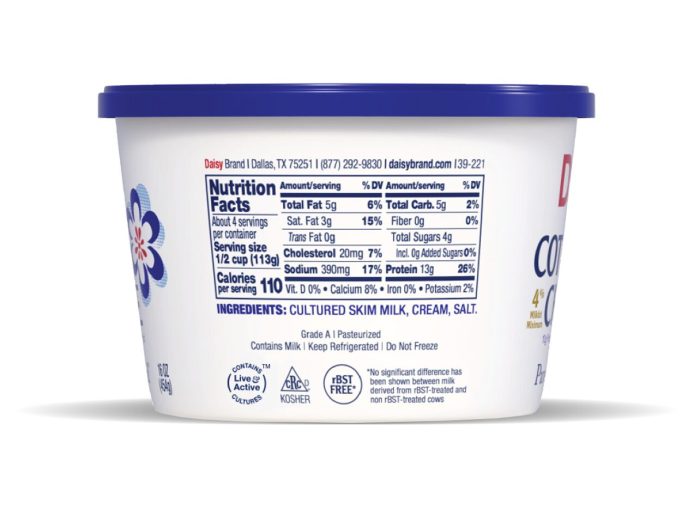
Right, so we’ve hyped up cottage cheese, but let’s get real. Ain’t all sunshine and rainbows. There are a few things to consider before you go full-on cottage cheese crazy. We’re talking potential downsides, the stuff that might make you think twice before scoffing down another tub.Lactose intolerance and sodium content are two biggies that can trip you up.
Some brands are higher in sodium than others, and if you’re lactose intolerant, well, you know the drill – bloating, cramps, the whole shebang. We’ll break down how to navigate these potential pitfalls.
Lactose Intolerance and Sodium Content in 4% Cottage Cheese
Lactose intolerance is a real buzzkill for some, especially when it comes to dairy. 4% cottage cheese, while generally lower in lactose than other dairy products, still contains it. The severity of the reaction varies from person to person. Some might experience mild discomfort, while others might have a full-blown reaction. Similarly, sodium content can be a concern for people watching their blood pressure.
Checking the nutrition label is crucial, comparing different brands to find one that fits your needs. Low-sodium options are available, but you might need to hunt around a bit.
Impact of Different Brands and Preparation Methods, 4 cottage cheese nutrition
Different brands, different results, innit? The nutritional value can vary wildly depending on the brand. Some might add extra stuff, like thickeners or flavourings, which can alter the fat, protein, and carbohydrate content. Preparation methods also play a role. Adding fruit, for example, increases the sugar content, while mixing it with savoury ingredients can affect the sodium levels.
Always check the label and be mindful of what you’re adding.
Nutritional Comparison of Different Fat Percentages
Yo, let’s get into the nitty-gritty. Here’s a table comparing the nutritional differences between 4%, 2%, and 1% cottage cheese. Remember, these are average values and can vary depending on the brand. Always check the label for the most accurate information.
| Nutrient | 4% Cottage Cheese (per 100g) | 2% Cottage Cheese (per 100g) | 1% Cottage Cheese (per 100g) |
|---|---|---|---|
| Calories | ~160 | ~110 | ~80 |
| Fat (g) | ~8 | ~4 | ~1 |
| Protein (g) | ~12-14 | ~12-14 | ~12-14 |
| Carbohydrates (g) | ~4-6 | ~4-6 | ~4-6 |
| Sodium (mg) | Varies greatly by brand | Varies greatly by brand | Varies greatly by brand |
Quick FAQs: 4 Cottage Cheese Nutrition
Can I eat cottage cheese if I’m lactose intolerant?
Lactose intolerance varies in severity. Some individuals can tolerate small amounts of cottage cheese, while others may experience digestive discomfort. Lactose-free cottage cheese options are also available.
How should I store cottage cheese to maintain its freshness?
Keep cottage cheese refrigerated at all times. Once opened, consume it within a week for optimal quality and taste.
Is cottage cheese a good source of probiotics?
While not as high in probiotics as some yogurts, some cottage cheese brands may contain live and active cultures, contributing to gut health. Check the label for confirmation.
Can I freeze cottage cheese?
Freezing cottage cheese can alter its texture, making it somewhat grainy upon thawing. It’s generally best consumed fresh.



